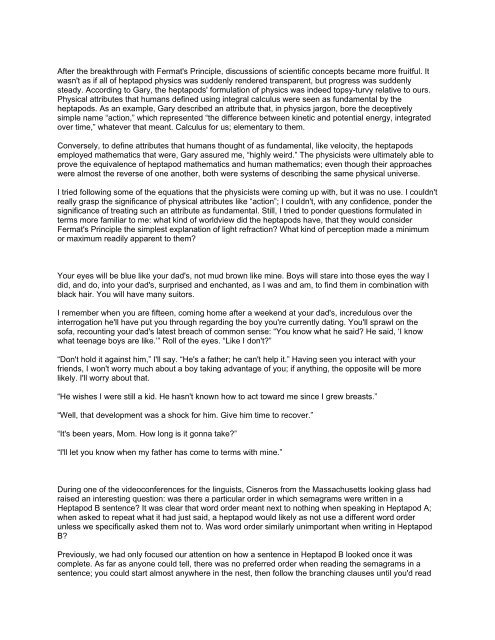Create successful ePaper yourself
Turn your PDF publications into a flip-book with our unique Google optimized e-Paper software.
After the breakthrough with Fermat's Principle, discussions <strong>of</strong> scientific concepts became more fruitful. It<br />
wasn't as if all <strong>of</strong> heptapod physics was suddenly rendered transparent, but progress was suddenly<br />
steady. According to Gary, the heptapods' formulation <strong>of</strong> physics was indeed topsy-turvy relative to ours.<br />
Physical attributes that humans defined using integral calculus were seen as fundamental by the<br />
heptapods. As an example, Gary described an attribute that, in physics jargon, bore the deceptively<br />
simple name “action,” which represented “the difference between kinetic and potential energy, integrated<br />
over time,” whatever that meant. Calculus for us; elementary to them.<br />
Conversely, to define attributes that humans thought <strong>of</strong> as fundamental, like velocity, the heptapods<br />
employed mathematics that were, Gary assured me, “highly weird.” The physicists were ultimately able to<br />
prove the equivalence <strong>of</strong> heptapod mathematics and human mathematics; even though their approaches<br />
were almost the reverse <strong>of</strong> one another, both were systems <strong>of</strong> describing the same physical universe.<br />
I tried following some <strong>of</strong> the equations that the physicists were coming up with, but it was no use. I couldn't<br />
really grasp the significance <strong>of</strong> physical attributes like “action”; I couldn't, with any confidence, ponder the<br />
significance <strong>of</strong> treating such an attribute as fundamental. Still, I tried to ponder questions formulated in<br />
terms more familiar to me: what kind <strong>of</strong> worldview did the heptapods have, that they would consider<br />
Fermat's Principle the simplest explanation <strong>of</strong> light refraction? What kind <strong>of</strong> perception made a minimum<br />
or maximum readily apparent to them?<br />
<strong>Your</strong> eyes will be blue like your dad's, not mud brown like mine. Boys will stare into those eyes the way I<br />
did, and do, into your dad's, surprised and enchanted, as I was and am, to find them in combination with<br />
black hair. You will have many suitors.<br />
I remember when you are fifteen, coming home after a weekend at your dad's, incredulous over the<br />
interrogation he'll have put you through regarding the boy you're currently dating. You'll sprawl on the<br />
s<strong>of</strong>a, recounting your dad's latest breach <strong>of</strong> common sense: “You know what he said? He said, ‘I know<br />
what teenage boys are like.’” Roll <strong>of</strong> the eyes. “Like I don't?”<br />
“Don't hold it against him,” I'll say. “He's a father; he can't help it.” Having seen you interact with your<br />
friends, I won't worry much about a boy taking advantage <strong>of</strong> you; if anything, the opposite will be more<br />
likely. I'll worry about that.<br />
“He wishes I were still a kid. He hasn't known how to act toward me since I grew breasts.”<br />
“Well, that development was a shock for him. Give him time to recover.”<br />
“It's been years, Mom. How long is it gonna take?”<br />
“I'll let you know when my father has come to terms with mine.”<br />
During one <strong>of</strong> the videoconferences for the linguists, Cisneros from the Massachusetts looking glass had<br />
raised an interesting question: was there a particular order in which semagrams were written in a<br />
Heptapod B sentence? It was clear that word order meant next to nothing when speaking in Heptapod A;<br />
when asked to repeat what it had just said, a heptapod would likely as not use a different word order<br />
unless we specifically asked them not to. Was word order similarly unimportant when writing in Heptapod<br />
B?<br />
Previously, we had only focused our attention on how a sentence in Heptapod B looked once it was<br />
complete. As far as anyone could tell, there was no preferred order when reading the semagrams in a<br />
sentence; you could start almost anywhere in the nest, then follow the branching clauses until you'd read



